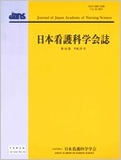Japanese
English
- 販売していません
- Abstract 文献概要
- 参考文献 Reference
要旨
目的:組織コミットメントとコンフリクト対処方略を含め,職務継続意思に対する影響要因のモデルから,介護老人福祉施設(以下,特養)における介護職と看護職の離職予防のためのマネジメントへの示唆を得る.
方法:全国400カ所の特養の介護職と看護職3名ずつに,90項目の無記名自記式質問紙を郵送し,分析対象の介護職316名,看護職250名(回収率25.3%)の回答を共分散構造分析で解析した.
結果:介護職のモデル適合度指数はGFI=0.925,AGFI=0.893,CFI=0.940,RMSEA=0.044,看護職はGFI=0.932,AGFI=0.901,CFI=0.945,RMSEA=0.039であった.介護職のコンフリクト対処方略は〈思いやり対処スタイル〉,看護職は〈消極的思いやり対処スタイル〉と命名した.組織コミットメントに影響する潜在変数として,介護職は〈職場キャリア〉と〈職員-幹部間意思疎通〉,看護職は〈人生キャリア〉と〈キャリアアップ機会〉が抽出された.
結論:特養の介護職と看護職の離職予防のために,職員と幹部との積極的情報交流,キャリアアップ制度やサポート体制の充実などが示唆された.
Aim: With the aim of obtaining suggestions for management that prevents turnover in facilities covered by public aid providing long-term care to the elderly, or intensive care homes for the elderly, we evaluated a model of care workers and nurses in these facilities to identify factors that affect their organizational commitment, their coping strategies for intergroup conflict and their intention to continue working.
Methods: Anonymous, self-administered questionnaires consisting of 90 items were sent by mail to three care workers and three nurses at 400 facilities covered by public aid providing long-term care to the elderly nationwide. Returned questionnaires from 316 care workers and 250 nurses (25.3% response rate) were processed by a covariance structure analysis for the causal model study.
Results: The fit indices of the model for care workers were GFI=0.925, AGFI=0.893, CFI=0.940, RMSEA=0.044. For nurses, the fit indices were GFI=0.932, AGFI=0.901, CFI=0.945, RMSEA=0.039. The intergroup conflict coping strategies identified from the causal model were “compassionate coping style” for care workers and “passive compassionate coping style” for nurses. As latent variables that affect organizational commitment, “workplace career” and “communication between employees and management” were identified for care workers, and “life career” and “career advancement opportunities” were identified for nurses.
Conclusion: These findings suggest that enhancing information exchange between employees and management and the development of career advancement and support systems are necessary to prevent turnover of care workers and nurses.
Copyright © 2015, Japan Academy of Nursing Science. All rights reserved.


